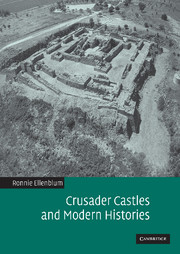Book contents
- Frontmatter
- Contents
- List of illustrations
- List of tables
- Acknowledgements
- Part I National discourse and the study of the Crusades
- Part II Crusader studies between colonialist and post-colonialist discourse
- 4 Colonial and anti-colonial interpretations
- 5 Who invented the concentric castles?
- 6 ‘Crusader cities’, ‘Muslim cities’, and the post-colonial debate
- 7 Crusader castle and Crusader city: is it possible to differentiate between the two?
- Part III Geography of fear and the spatial distribution of Frankish castles
- Part IV The castle as dialogue between siege tactics and defence strategy
- Conclusion
- Appendix
- Bibliography
- Author index
- Subject index
6 - ‘Crusader cities’, ‘Muslim cities’, and the post-colonial debate
Published online by Cambridge University Press: 29 July 2009
- Frontmatter
- Contents
- List of illustrations
- List of tables
- Acknowledgements
- Part I National discourse and the study of the Crusades
- Part II Crusader studies between colonialist and post-colonialist discourse
- 4 Colonial and anti-colonial interpretations
- 5 Who invented the concentric castles?
- 6 ‘Crusader cities’, ‘Muslim cities’, and the post-colonial debate
- 7 Crusader castle and Crusader city: is it possible to differentiate between the two?
- Part III Geography of fear and the spatial distribution of Frankish castles
- Part IV The castle as dialogue between siege tactics and defence strategy
- Conclusion
- Appendix
- Bibliography
- Author index
- Subject index
Summary
The two approaches, one which emphasises the influence of the European legacy on the Frankish settlements in the East, and the other which stresses the importance of the Levantine heritage on Frankish building activities, are manifested once again in the controversy over the origin of the ‘Crusader city’.
Most of the scholars who traced the origins of the Frankish city pointed to the resemblances between the Frankish urban centres and their contemporary European counterparts, but many of them encountered enormous conceptual difficulties with the application of the Western model to the Frankish city and in their attempt to differentiate between ‘cities’, ‘castles’, or ‘villages’. But here, too, it was Joshua Prawer who raised a stimulating alternative by pointing out the importance of the Eastern tradition in the creation of the ‘Crusader cities’. Prawer puts forth his ideas in a comprehensive study, which once again presents his all-inclusive historiographic approach, and his assertion that the Franks abstained from settling the countryside for reasons of security. He does not distinguish between fortified and unwalled cities, asserting that life in a Levantine city – any city – was safer and more comfortable than life in any Eastern village.
The Franks, he maintains, did not establish new cities during the two centuries of their rule in the Levant. They adopted the classical and Muslim cities and settled in them, while launching a process of rapid urbanisation: ‘The creation of the Crusaders' city-settlement and city population’, he says, ‘was conditioned and defined by the intrusion of a mainly agricultural and village-dwelling society into a country where the city had been for centuries an established and central institution.’
- Type
- Chapter
- Information
- Crusader Castles and Modern Histories , pp. 73 - 83Publisher: Cambridge University PressPrint publication year: 2007



